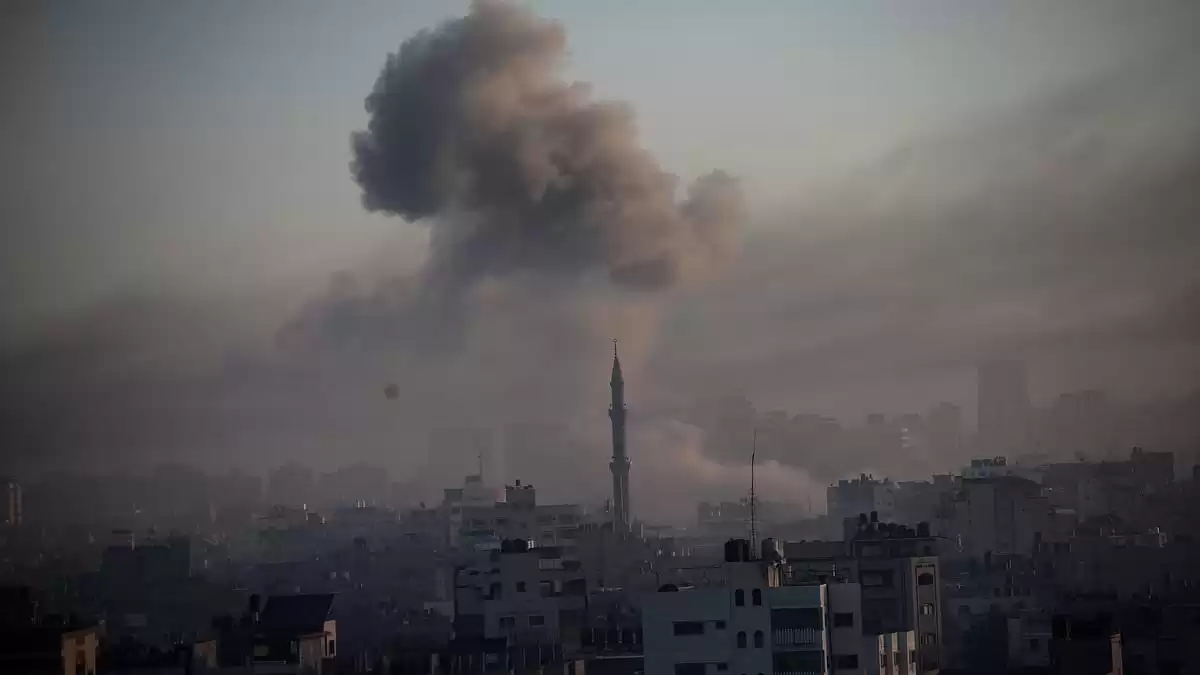Gaza on Brink of Collapse: UN Chiefs Warn
Terrified families flee Gaza as aid agencies warn of it becoming a 'hellhole'; Israel prepares for invasion.
Families in Gaza were filled with terror as they fled their homes, seeking refuge from the deteriorating conditions that had turned their city into a "hellhole." Women carried their children, their faces etched with fear and desperation, as they made their way on foot, their belongings piled high on trucks and donkey carts. Despite official pleas from Hamas to stay in their homes, families embarked on an extraordinary journey into the unknown, driven by the urgency to escape before Israel escalated its military retaliation for the recent terror attacks.
The civilians of Gaza had already endured a week of devastating airstrikes that had destroyed entire neighborhoods and claimed the lives of 1,900 people. Meanwhile, Israel's soldiers, tanks, and guns continued to amass on the border, fueling fears of an imminent invasion. The Israeli military's might included massive armored bulldozers capable of demolishing buildings to clear a path for troops and tanks.
Aid agencies warned that the unprecedented evacuation of Gaza would be impossible to achieve fully, especially considering the tens of thousands already living in refugee camps. The Israeli military had ordered the population in the northern part of the territory to move south, below the Wadi Gaza. This meant that over a million people from the north would now have to cram into the southern part of the already overcrowded 25-mile-long strip of land.
The World Health Organization expressed concern that evacuating those with severe injuries would essentially be a death sentence. Philippe Lazzarini, commissioner general of the UN's Palestinian refugee agency, described Gaza as rapidly descending into a "hellhole" and on the verge of collapse. Reports emerged of huge queues of traffic as thousands of people attempted to head south, with some claiming that Hamas had blocked roads. Even those who had reached the south reported that they were still under fire.
One family of 16, who claimed to be British, stated that they were crammed into a house with 60 others, highlighting the dire conditions they were facing. Mohammed, a member of the family, recounted their harrowing escape, stating that they had fled with his 77-year-old father and three young children. He expressed his fear for the safety of his children and criticized the lack of a plan from the British consulate in London to help them escape.
The Archbishop of Canterbury called for a humanitarian corridor in Gaza, emphasizing that civilians should not bear the costs of terrorism. He condemned the attacks by Hamas but also acknowledged Israel's justified anger. However, he stressed that the two million civilians in Gaza were facing a catastrophe.
Scottish First Minister Humza Yousaf expressed frustration with the government's response and accused them of placing a different value on Palestinian lives compared to Israeli lives. Yousaf, who had a personal connection to someone trapped in Gaza, called on the government to pressure Israel to protect civilian lives.
Israel's military response had already caused the shutdown of Gaza's only power plant due to fuel shortages, leaving the territory without electricity or running water. Hospitals were overwhelmed with casualties from the airstrikes and were operating on limited emergency generators that were also running out of fuel. The situation had reached a critical point, with organizations like Medicins San Frontieres reporting that they had been given only two hours to evacuate while still treating patients.
The Norwegian Refugee Council condemned Israel's demand for a mass evacuation, labeling it a war crime. The organization's secretary general stated that the collective punishment of civilians, including children, women, and the elderly, in retaliation for acts of terror was illegal under international law. Despite acknowledging that the 24-hour deadline for evacuation might be unrealistic, Israel continued to amass its soldiers and tanks near the border, vowing to maintain its blockade until all hostages taken in the recent attacks were released by Hamas.











Comments on Gaza on Brink of Collapse: UN Chiefs Warn